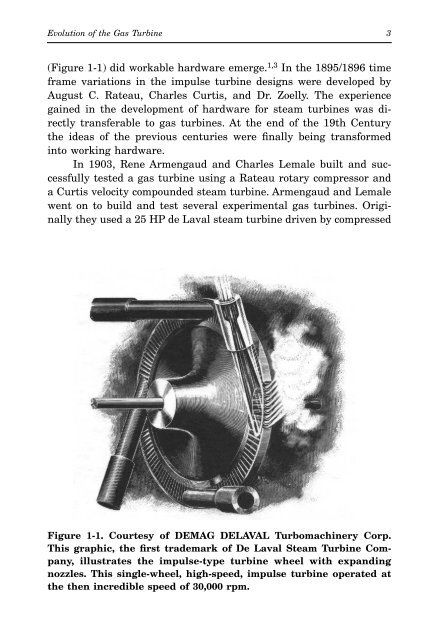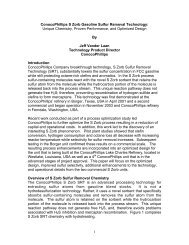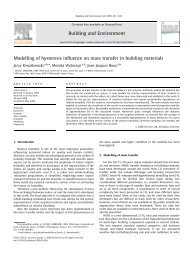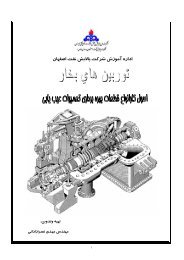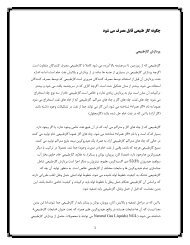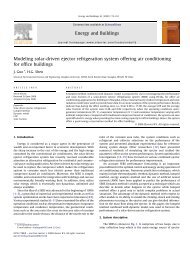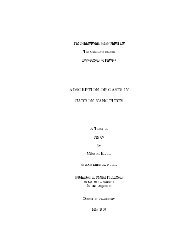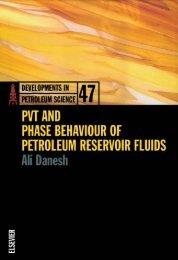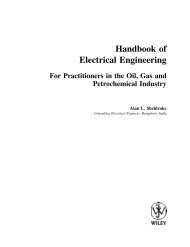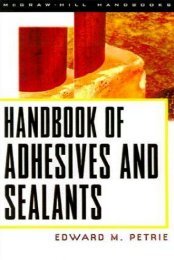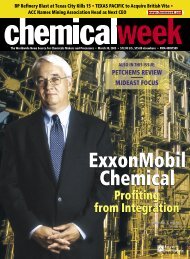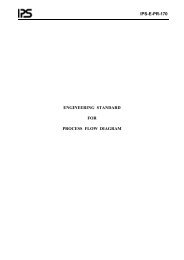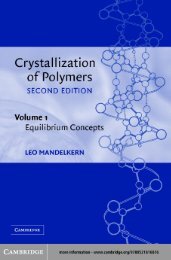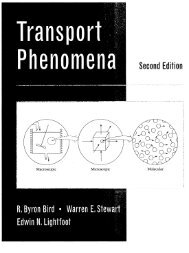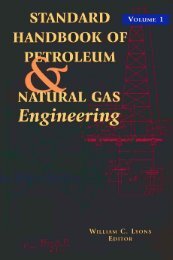- Page 2 and 3: Gas Turbine Handbook: Principles an
- Page 4 and 5: Gas Turbine Handbook: Principles an
- Page 6 and 7: Dedication This book is dedicated t
- Page 8 and 9: Contents PREFACE ..................
- Page 10 and 11: Chapter 13—BOROSCOPE INSPECTION .
- Page 12 and 13: Preface to the Third Edition The ne
- Page 14 and 15: Acknowledgments I wish to thank the
- Page 18 and 19: 4 Gas Turbine Handbook: Principles
- Page 20 and 21: 6 Gas Turbine Handbook: Principles
- Page 22 and 23: 8 Gas Turbine Handbook: Principles
- Page 24 and 25: 10 Gas Turbine Handbook: Principles
- Page 26 and 27: 12 Gas Turbine Handbook: Principles
- Page 28 and 29: Figure 2-3. Courtesy of United Tech
- Page 30 and 31: 16 Gas Turbine Handbook: Principles
- Page 32 and 33: 18 Gas Turbine Handbook: Principles
- Page 34 and 35: 20 Gas Turbine Handbook: Principles
- Page 36 and 37: 22 Gas Turbine Handbook: Principles
- Page 38 and 39: 24 Gas Turbine Handbook: Principles
- Page 40 and 41: 26 Gas Turbine Handbook: Principles
- Page 42 and 43: 28 Gas Turbine Handbook: Principles
- Page 44 and 45: 30 Gas Turbine Handbook: Principles
- Page 46 and 47: 32 Gas Turbine Handbook: Principles
- Page 48 and 49: 34 Gas Turbine Handbook: Principles
- Page 50 and 51: 36 Gas Turbine Handbook: Principles
- Page 52 and 53: 38 Gas Turbine Handbook: Principles
- Page 54 and 55: 40 Gas Turbine Handbook: Principles
- Page 56 and 57: 42 Gas Turbine Handbook: Principles
- Page 58 and 59: This page intentionally left blank
- Page 60 and 61: 46 Gas Turbine Handbook: Principles
- Page 62 and 63: 48 Gas Turbine Handbook: Principles
- Page 64 and 65: 50 Gas Turbine Handbook: Principles
- Page 66 and 67:
52 Gas Turbine Handbook: Principles
- Page 68 and 69:
54 Gas Turbine Handbook: Principles
- Page 70 and 71:
56 Gas Turbine Handbook: Principles
- Page 72 and 73:
58 Gas Turbine Handbook: Principles
- Page 74 and 75:
60 Gas Turbine Handbook: Principles
- Page 76 and 77:
62 Gas Turbine Handbook: Principles
- Page 78 and 79:
64 Gas Turbine Handbook: Principles
- Page 80 and 81:
66 Gas Turbine Handbook: Principles
- Page 82 and 83:
68 Gas Turbine Handbook: Principles
- Page 84 and 85:
70 Gas Turbine Handbook: Principles
- Page 86 and 87:
72 Gas Turbine Handbook: Principles
- Page 88 and 89:
74 Gas Turbine Handbook: Principles
- Page 90 and 91:
Figure 5-4. Courtesy of United Tech
- Page 92 and 93:
78 Gas Turbine Handbook: Principles
- Page 94 and 95:
80 Gas Turbine Handbook: Principles
- Page 96 and 97:
82 Gas Turbine Handbook: Principles
- Page 98 and 99:
84 Gas Turbine Handbook: Principles
- Page 100 and 101:
86 Gas Turbine Handbook: Principles
- Page 102 and 103:
88 Gas Turbine Handbook: Principles
- Page 104 and 105:
90 Gas Turbine Handbook: Principles
- Page 106 and 107:
92 Gas Turbine Handbook: Principles
- Page 108 and 109:
94 Gas Turbine Handbook: Principles
- Page 110 and 111:
96 Gas Turbine Handbook: Principles
- Page 112 and 113:
98 Gas Turbine Handbook: Principles
- Page 114 and 115:
100 Gas Turbine Handbook: Principle
- Page 116 and 117:
102 Gas Turbine Handbook: Principle
- Page 118 and 119:
104 Gas Turbine Handbook: Principle
- Page 120 and 121:
106 Gas Turbine Handbook: Principle
- Page 122 and 123:
108 Gas Turbine Handbook: Principle
- Page 124 and 125:
110 Gas Turbine Handbook: Principle
- Page 126 and 127:
112 Gas Turbine Handbook: Principle
- Page 128 and 129:
This page intentionally left blank
- Page 130 and 131:
Chart 8-1 Gas Turbine Environments
- Page 132 and 133:
118 Gas Turbine Handbook: Principle
- Page 134 and 135:
120 Gas Turbine Handbook: Principle
- Page 136 and 137:
122 Gas Turbine Handbook: Principle
- Page 138 and 139:
124 Gas Turbine Handbook: Principle
- Page 140 and 141:
126 Gas Turbine Handbook: Principle
- Page 142 and 143:
128 Gas Turbine Handbook: Principle
- Page 144 and 145:
130 Gas Turbine Handbook: Principle
- Page 146 and 147:
132 Gas Turbine Handbook: Principle
- Page 148 and 149:
134 Gas Turbine Handbook: Principle
- Page 150 and 151:
136 Gas Turbine Handbook: Principle
- Page 152 and 153:
138 Gas Turbine Handbook: Principle
- Page 154 and 155:
140 Gas Turbine Handbook: Principle
- Page 156 and 157:
142 Gas Turbine Handbook: Principle
- Page 158 and 159:
144 Gas Turbine Handbook: Principle
- Page 160 and 161:
146 Gas Turbine Handbook: Principle
- Page 162 and 163:
148 Gas Turbine Handbook: Principle
- Page 164 and 165:
150 Gas Turbine Handbook: Principle
- Page 166 and 167:
152 Gas Turbine Handbook: Principle
- Page 168 and 169:
154 Gas Turbine Handbook: Principle
- Page 170 and 171:
156 Gas Turbine Handbook: Principle
- Page 172 and 173:
158 Gas Turbine Handbook: Principle
- Page 174 and 175:
160 Gas Turbine Handbook: Principle
- Page 176 and 177:
162 Gas Turbine Handbook: Principle
- Page 178 and 179:
164 Gas Turbine Handbook: Principle
- Page 180 and 181:
166 Gas Turbine Handbook: Principle
- Page 182 and 183:
This page intentionally left blank
- Page 184 and 185:
170 Gas Turbine Handbook: Principle
- Page 186 and 187:
172 Gas Turbine Handbook: Principle
- Page 188 and 189:
174 Gas Turbine Handbook: Principle
- Page 190 and 191:
176 Gas Turbine Handbook: Principle
- Page 192 and 193:
178 Gas Turbine Handbook: Principle
- Page 194 and 195:
180 Gas Turbine Handbook: Principle
- Page 196 and 197:
This page intentionally left blank
- Page 198 and 199:
184 Gas Turbine Handbook: Principle
- Page 200 and 201:
186 Gas Turbine Handbook: Principle
- Page 202 and 203:
188 Gas Turbine Handbook: Principle
- Page 204 and 205:
190 Gas Turbine Handbook: Principle
- Page 206 and 207:
192 Gas Turbine Handbook: Principle
- Page 208 and 209:
194 Gas Turbine Handbook: Principle
- Page 210 and 211:
196 Gas Turbine Handbook: Principle
- Page 212 and 213:
198 Gas Turbine Handbook: Principle
- Page 214 and 215:
200 Gas Turbine Handbook: Principle
- Page 216 and 217:
202 Gas Turbine Handbook: Principle
- Page 218 and 219:
This page intentionally left blank
- Page 220 and 221:
206 Gas Turbine Handbook: Principle
- Page 222 and 223:
208 Gas Turbine Handbook: Principle
- Page 224 and 225:
210 Gas Turbine Handbook: Principle
- Page 226 and 227:
212 Gas Turbine Handbook: Principle
- Page 228 and 229:
214 Gas Turbine Handbook: Principle
- Page 230 and 231:
216 Gas Turbine Handbook: Principle
- Page 232 and 233:
218 Gas Turbine Handbook: Principle
- Page 234 and 235:
220 Gas Turbine Handbook: Principle
- Page 236 and 237:
222 Gas Turbine Handbook: Principle
- Page 238 and 239:
224 Gas Turbine Handbook: Principle
- Page 240 and 241:
226 Gas Turbine Handbook: Principle
- Page 242 and 243:
228 Gas Turbine Handbook: Principle
- Page 244 and 245:
230 Gas Turbine Handbook: Principle
- Page 246 and 247:
232 Gas Turbine Handbook: Principle
- Page 248 and 249:
234 Gas Turbine Handbook: Principle
- Page 250 and 251:
236 Gas Turbine Handbook: Principle
- Page 252 and 253:
238 Gas Turbine Handbook: Principle
- Page 254 and 255:
240 Gas Turbine Handbook: Principle
- Page 256 and 257:
242 Gas Turbine Handbook: Principle
- Page 258 and 259:
244 Gas Turbine Handbook: Principle
- Page 260 and 261:
246 Gas Turbine Handbook: Principle
- Page 262 and 263:
248 Gas Turbine Handbook: Principle
- Page 264 and 265:
250 Gas Turbine Handbook: Principle
- Page 266 and 267:
252 Gas Turbine Handbook: Principle
- Page 268 and 269:
254 Gas Turbine Handbook: Principle
- Page 270 and 271:
Figure 15-4. Corinth Motor Oil Refi
- Page 272 and 273:
258 Gas Turbine Handbook: Principle
- Page 274 and 275:
260 Gas Turbine Handbook: Principle
- Page 276 and 277:
262 Gas Turbine Handbook: Principle
- Page 278 and 279:
264 Gas Turbine Handbook: Principle
- Page 280 and 281:
266 Gas Turbine Handbook: Principle
- Page 282 and 283:
268 Gas Turbine Handbook: Principle
- Page 284 and 285:
270 Gas Turbine Handbook: Principle
- Page 286 and 287:
272 Gas Turbine Handbook: Principle
- Page 288 and 289:
274 Gas Turbine Handbook: Principle
- Page 290 and 291:
276 Gas Turbine Handbook: Principle
- Page 292 and 293:
278 Gas Turbine Handbook: Principle
- Page 294 and 295:
280 Gas Turbine Handbook: Principle
- Page 296 and 297:
282 Gas Turbine Handbook: Principle
- Page 298 and 299:
284 Gas Turbine Handbook: Principle
- Page 300 and 301:
286 Gas Turbine Handbook: Principle
- Page 302 and 303:
288 Gas Turbine Handbook: Principle
- Page 304 and 305:
290 Gas Turbine Handbook: Principle
- Page 306 and 307:
292 Gas Turbine Handbook: Principle
- Page 308 and 309:
294 Gas Turbine Handbook: Principle
- Page 310 and 311:
296 Gas Turbine Handbook: Principle
- Page 312 and 313:
298 Gas Turbine Handbook: Principle
- Page 314 and 315:
300 Gas Turbine Handbook: Principle
- Page 316 and 317:
302 Gas Turbine Handbook: Principle
- Page 318 and 319:
Appendix A-2 304 Gas Turbine Handbo
- Page 320 and 321:
306 Gas Turbine Handbook: Principle
- Page 322 and 323:
308 Gas Turbine Handbook: Principle
- Page 324 and 325:
310 Gas Turbine Handbook: Principle
- Page 326 and 327:
312 Gas Turbine Handbook: Principle
- Page 328 and 329:
314 Gas Turbine Handbook: Principle
- Page 330 and 331:
316 Gas Turbine Handbook: Principle
- Page 332 and 333:
318 Gas Turbine Handbook: Principle
- Page 334 and 335:
320 Gas Turbine Handbook: Principle
- Page 336 and 337:
322 Gas Turbine Handbook: Principle
- Page 338 and 339:
This page intentionally left blank
- Page 340 and 341:
326 Gas Turbine Handbook: Principle
- Page 342 and 343:
328 Gas Turbine Handbook: Principle
- Page 344 and 345:
330 Gas Turbine Handbook: Principle
- Page 346 and 347:
332 Gas Turbine Handbook: Principle
- Page 348 and 349:
334 Gas Turbine Handbook: Principle
- Page 350 and 351:
336 Gas Turbine Handbook: Principle
- Page 352 and 353:
338 Gas Turbine Handbook: Principle
- Page 354 and 355:
340 Gas Turbine Handbook: Principle
- Page 356 and 357:
342 Gas Turbine Handbook: Principle
- Page 358 and 359:
344 Gas Turbine Handbook: Principle
- Page 360 and 361:
346 Gas Turbine Handbook: Principle
- Page 362 and 363:
348 Gas Turbine Handbook: Principle
- Page 364 and 365:
350 Gas Turbine Handbook: Principle
- Page 366 and 367:
352 Gas Turbine Handbook: Principle
- Page 368 and 369:
354 Gas Turbine Handbook: Principle
- Page 370 and 371:
5. Weather Hood Material __________
- Page 372 and 373:
Appendix C-6 Air/Oil Cooler Specifi
- Page 374 and 375:
9. Drive Requirements A. Hydraulic
- Page 376 and 377:
22. Packaging For Shipment Per Spec
- Page 378 and 379:
Parameters Units NH 3 CO H 2 CH 4 C
- Page 380 and 381:
.055 Parameters Units 1/0 .88/.12 .
- Page 382 and 383:
Koppers Foster Blue Coal Gas Winkle
- Page 384 and 385:
370 Gas Turbine Handbook: Principle
- Page 386 and 387:
372 Gas Turbine Handbook: Principle
- Page 388 and 389:
374 Gas Turbine Handbook: Principle
- Page 390 and 391:
376 Gas Turbine Handbook: Principle
- Page 392 and 393:
378 Gas Turbine Handbook: Principle
- Page 394 and 395:
380 Gas Turbine Handbook: Principle
- Page 396 and 397:
382 Gas Turbine Handbook: Principle
- Page 398 and 399:
384 Gas Turbine Handbook: Principle
- Page 400 and 401:
386 Gas Turbine Handbook: Principle
- Page 402 and 403:
388 Gas Turbine Handbook: Principle
- Page 404 and 405:
This page intentionally left blank
- Page 406 and 407:
392 Gas Turbine Handbook: Principle
- Page 408 and 409:
394 Gas Turbine Handbook: Principle
- Page 410 and 411:
396 Gas Turbine Handbook: Principle
- Page 412 and 413:
398 Gas Turbine Handbook: Principle
- Page 414 and 415:
400 Gas Turbine Handbook: Principle
- Page 416 and 417:
402 Gas Turbine Handbook: Principle
- Page 418 and 419:
404 Gas Turbine Handbook: Principle
- Page 420 and 421:
406 Gas Turbine Handbook: Principle
- Page 422 and 423:
408 Gas Turbine Handbook: Principle
- Page 424 and 425:
410 Gas Turbine Handbook: Principle
- Page 426 and 427:
412 Gas Turbine Handbook: Principle
- Page 428 and 429:
414 Gas Turbine Handbook: Principle
- Page 430 and 431:
416 Gas Turbine Handbook: Principle
- Page 432 and 433:
418 Gas Turbine Handbook: Principle
- Page 434 and 435:
420 Gas Turbine Handbook: Principle
- Page 436 and 437:
422 Gas Turbine Handbook: Principle
- Page 438 and 439:
424 Gas Turbine Handbook: Principle
- Page 440 and 441:
This page intentionally left blank
- Page 442 and 443:
428 Gas Turbine Handbook: Principle
- Page 444 and 445:
430 Gas Turbine Handbook: Principle
- Page 446 and 447:
432 Gas Turbine Handbook: Principle
- Page 448 and 449:
434 Gas Turbine Handbook: Principle
- Page 450 and 451:
436 Gas Turbine Handbook: Principle


